
Jeremy Clyde was one half of Chad and Jeremy, a musical duo on the softer end of the British Invasion spectrum. Their hits included 1963′s “Yesterday’s Gone” and 1964’s “A Summer Song”, featuring pleasant harmonies and lush orchestration. As the ’60’s unfolded, they became more experimental with the albums Of Cabbages and Kings (1967) and The Ark (1968), which are now considered cult classics amongst baroque-psych fans, many of whom are at least one generation removed from the creators. Clyde has also had a long-time collaboration with lyricist David Pierce which has thus far produced four albums worth of songs in the series The Bottom Drawer Sessions. Clyde has also had a notable career as an actor.
This interview was for a preview article for noozhawk.com for Jeremy Clyde’s performance with Peter Asher at the Lobero Theatre in Santa Barbara on 11/11/18. It was done by phone on 11/1/18.
Jeff Moehlis: Can you tell us a bit about what we can look forward to at the upcoming show?
Jeremy Clyde: I can tell you in one swift, happy sentence: Twice the hits, twice the stories [both laugh]. Chad [Stuart] retired, that’s the short story. He’d been threatening to for years and years. He hated going out on the road. “You’re dragging me out again,” he would say. So he finally went and did it.
Peter and I have been old, old friends for a long, long time – we reckon since 1963. It was an obvious thing to do, because Gordon [Waller] had passed away some years ago now, and there were the two of us. We’re combining hits and our stories, and the way our stories interlock, because there were in the same pond, we knew a lot of the same people, and we were also always [laughs] very much confused with each other. We have a lot of fun with that.
And the other thing we have, which makes it extra fun, is we have lots of clips and stills and some wonderful stuff. We’ve got our Batman appearance – we show a bit of that, and a bit of Dick Van Dyke, a bit of Patty Duke. This is stuff that Chad and I did. And a couple of wonderfully embarrassing things that Peter has managed to dig up [laughs] from his past life, plus his wonderful career as a producer and manager. So there’s endless stories that people haven’t necessarily heard, and background on the ’60’s to now, really.
I’m looking forward to Santa Barbara because it’s the last date of this current run, and it’s a beautiful town.
JM: Do you remember when you first met Peter so many years ago?
JC: No, we kick off the show trying to work that out. We’re absolutely certain that it was in 1963, and that it was at a place called The Pickwick Club. Because Peter and Gordon were playing – Peter being my friend, Gordon I hardly knew except through Peter. They were over there doing much the same sort of thing as we were doing in another venue over on the other side of the town called Tina’s Bar.
In fact, when John Barry, the late, great movie composer, signed Chad and I to a deal in 1963, I must’ve known Peter then because I rang him up [laughs] and said, “Listen, would you like another gig? Because we’re leaving. We got a record. Would you like a job?” And he said yes, because it was actually a lunchtime job, so he could do it and work in the evening at the Pickwick.
An extraordinary thing was that within the year we were all in the charts together, and people couldn’t work out which was which [laughs]. It’s kind of an extraordinary story about four people… We take credit for each other’s work a lot of the time, because it was so tiring saying, “No, that’s not us.” [laughs]
JM: Would you characterize this as a friendly rivalry back then?
JC: Yes, I would. I mean, more friend than rival. It was made into a rivalry. The press loved it. It was the same deal as The Beatles and The Stones, in the way that they were perfectly good friends, and so were Peter and Gordon and Chad and Jeremy. It makes good copy, but actually we were pals.
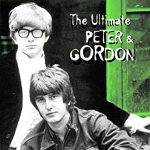
We play on this a little bit in the show, because they had a Number One hit and we never had a Number One hit, so there’s a good deal of grumbling about that [laughs]. Then they were on a nice big label – Capitol, I think – and we weren’t. We were on a tiny, little label. So we were working with one hand tied behind our backs slightly, in terms of push from the media. But it all worked out in the end.
It’s a fun show. I love doing it, because it’s terribly relaxing. I mean, I’m also doing my own shows. Peter has his own shows as well, that he does – his memoir show, and a show with Albert Lee, a famous guitarist. And then I have my show, because I’ve been putting out my own stuff. I have all these songs in the bottom drawer, and I’ve been putting out something called The Bottom Drawer Sessions for the past four years. People are really picking up on that. And that’s interesting, because I’m now beginning to move beyond the nostalgia audience to a different crowd. I’m working with people who are in their late-20’s. That is interesting, and that’s bringing in a whole other gang.
I’m really having fun with that. I’m working with a couple of string players and a guitarist – a wonderful cellist called Emily Elkin and a violinist Kaitlin Wolfberg. That has given a completely new take on our material. What is interesting is if you go back – I do a lot of this – and look at old songs and strip them right back down to the originals, to the songs. If the song is well-built, and they are, they’re pretty sturdy – I wrote some of them, so hurray, hurray, and Chad was a wonderful writer – it’s interesting how they dust off very nicely indeed. They come alive. There are a lot of people now in their 20’s and early-30’s who are very, very interested in the ’60’s as a period, and so it’s a whole other gang. The show with Peter and I is very much built for the people who were there. “Oh, I remember you from when I was 14.” But there is this other gang of young people who would’ve wanted to be there and weren’t. And that’s a whole other school that I’m very interested in exploring.
JM: Well, I was born in 1970…
JC: Oh, you’re a junior!
JM: …and Chad and Jeremy had already broken up by that point. But I still enjoy the music.
JC: There are certain things that you do not see coming. One of the things I never saw coming, I don’t know about you, is the return of vinyl. What is interesting is that all of the songs that have been in the bottom drawer, you know, The Bottom Drawer Sessions – there are going to be seven of these albums, I’ve got four going – they’re beginning to get picked up by the young, and I’m trying to get them onto vinyl, because that’s where they belong. I mean, people write letters in these songs, and are unable to get ahold of each other. They don’t just have a mobile telephone, or say “I’ve saved all your emails.” I don’t think so. “I’ve saved all your letters.” And that’s another interesting thing. They belong on that format, so that’s the next thing that I want to get to. But there’s a budget and we have to get there, and it’s only just starting out, this game.
JM: It wasn’t a Number One hit, but you had a nice hit with the song “Yesterday’s Gone”. How did that song come together?
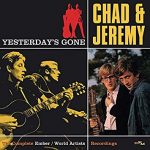
JC: First of all, it was one that Chad had written. The thing about Chadwick, I look back at his life and I say, “Well, every ten years he wrote the best song that you’ve ever heard in your life.” Just one [laughs]. Chad had written this song and we were signed by the late, great John Barry of film music fame, and he said, “That’s a great song. We’ll do that.” And we did it, and we had a sort-of hit in England with it. I mean, it wasn’t huge, but we got into the charts. And then we couldn’t follow it up, at all. We were sort of dead in the water, and I thought it was over.
And then, we got a call from our publisher saying, “You’re not going to believe this, guys. You’re going up the charts in America.” “What?” “Oh, yeah, there’s slight problem though.” “What’s that?” “You’re going up the Country charts.” [laughs] And then, of course, the British Invasion happened at the same time, and that’s when the country boys said, “Right, you’ve got hair and you’re English – you’re outta here.” That’s when we crossed over, as they say in the trade, and became fully paid up members of what is now known as the British Invasion. So that’s the coincidence, and that’s how it started.
JM: What was it like working with John Barry?
JC: Oh, he was a nice man. I liked him very, very much. Not only that, he was very generous. Chad is a wonderful musician – I mean, he was classically trained. He could score for orchestras. He did the original string parts for “Yesterday’s Gone”, and John just took a look at them and said, “Yeah, they’re fine. Great. Let’s do it.” Not everybody would do that. They would want a hand in that. But he saw Chad’s talent, and I suppose some of mine in it’s way. He was a very generous and nice man. I liked him very much.
The problem was that unfortunately the record label kind of came to grief very quickly, because he fell out with his business partner and left the label, and left us with the chap he’d fallen out with, who was considerably less nice. We lost Daddy, so to speak. It was a bit like The Beatles losing [Brian] Epstein, I guess, in some respects.
We worked with some good people – Shel Talmy was a wonderful producer. He came in and sort of finished up what John was doing. He’d been working with The Who. He’d did “My Generation”, a fantastic track. He was a sweet man, but he wasn’t John. And so we floundered about.
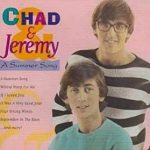
“A Summer Song” then became this huge hit for us. Actually Chad completed the song. He wrote the bridge to a song that a couple of folky friends of his were working on. We tried releasing that in England, and nobody cared at all, because it wasn’t Beat Group, it didn’t have a beat. It was too soppy. But in America they absolutely went for it, and now it appears in movies and all kinds of things.
JM: Can you tell us some memories of when Chad and Jeremy first came to America?
JC: Extraordinary! We were, I believe technically, the first of the British Invasion, as it is now known, to be on the West Coast. When we arrived in L.A., we didn’t know but the radio stations had been primed. The Los Angeles Airport was awash with screaming ladies, young women.
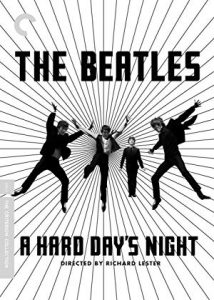
It was like A Hard Day’s Night. I mean, it was just like that. We had the most hair-raising drive down the freeway. We were accompanied by carfulls of young women sort of screaming and trying to get in front of us. We nearly had several crashes. And then we pulled up at the Beverly Wilshire Hotel, and the guys from the label said, “Run for it! Run for it!” Because it was very hairy. Just coming out of the entrance of the Beverly Wilshire Hotel [laughs] were a wedding party, with full gowns, and we just went straight through them. We just totalled them, followed by hysterical young ladies. Then we got up to the floor, and there was a laundry basket, and suddenly they popped out of there. I mean, it was A Hard Day’s Night. Extraordinary!
We’d experienced some of this because of “Yesterday’s Gone” being a hit in England, but one of the things that people don’t talk about is how dangerous it was, and how scary, and how painful. Because they would pull at you. They’d grab hunks of your hair, they’d tear your clothes. One young woman actually jumped on Chad from quite a height as we were making an entrance out of a tunnel. They were waiting on the top of the tunnel and jumped on Chad. Chad was furious, not for him but for the guitar.
Then there was, of course, the screaming, which was bonkers. It didn’t make any sense. And like everybody else we got fed up with it because I couldn’t hear Chad, Chad couldn’t hear me. God knows, we might as well have just stood there and shaken our heads in Beatle fashion, and they would’ve all gone mad.
The other thing was that the sound systems were archaic. They were made for Big Bands in the ’40’s or something. So hearing what you did onstage, we got very, very good at lip reading each other and staying in time because of that. So it was very hard work, actually, for not much reward other than financial.
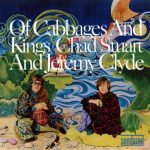
JM: I’m one of those that loves your album Of Cabbages and Kings.
JC: Ah, my boy, my boy.
JM: Looking back 51 years later, what are your reflections on that particular album?
JC: Well, I have reflections on two albums – that one, and the one after it, The Ark, which is actually my preferred one. I wrote a lot of those songs, and when I do my own Bottom Drawer Sessions show, I do four songs from those, again stripping them down to see what the songs were all about. From Of Cabbages and Kings I do “Progress”, which then became this vast extravaganza that Chad put together called the “The Progress Suite” [laughs], which is the whole second side. I mean, Ringo said about Sgt. Pepper was that was when he learned to play chess. I had somewhat the same experience, because I would write the songs, put down my guitar track, and then Chad and Gary Usher would go to work having enormous fun trying to make 16 tracks by hooking up two 8-tracks, which would then immediately go out of phase after about 10 seconds. And then they’d start cutting the thing together. It was just endless, and I just sat in the studio watching this stuff.
My old friend Phil Proctor from The Firesign Theatre – I saw him the other day in California – they were on it because they were working with Gary Usher making wonderful comedy albums, classics now. It sort of got out of control.
Chad got ill and I went off to do a play, and actually I think we had pretty much finished Of Cabbages and Kings before Sgt. Pepper came out. So, “Oh, you were just copying The Beatles” – actually not. Which is not to say that everybody wasn’t trying everything in the studios. It was a very, very experimental time. I find it a little overwhelming now, but what is interesting is that these people in their 20’s and early 30’s are really interested. It’s become incredibly fashionable again. Psychedelic music is back – ’60’s psychedelic music is huge again. So that is really extraordinary, 50 years later for The Ark. It’s fun to do the songs and look at them as historical documents about how we felt about things at that time, with hindsight, which is fascinating. So there you are.
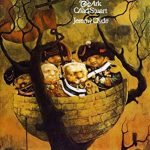
I’m particularly fond of The Ark, but by that time we weren’t selling. The label couldn’t wait to get rid of us. We were spending vast amounts of studio time, and the budgets were through the roof. We were not getting hits anymore, and the scene had moved on. People didn’t care, and they hardly sold at all. And now they have a place which is very honorable. So in retrospect I’m thrilled [laughs]. Now this stuff is appealing to a whole other generation. That is really remarkable. I didn’t see that coming, or vinyl. Lots of things.
JM: I’m sure you’re in touch with Chad. Is he enjoying his retirement?
JC: Yes, he is very much so. He was slowing down, and we did a final tour which was the most exhausting thing I think I’ve ever done in my life, personally. We covered the United States, and Chad was getting tired and slowing down. It was what it was. But we were determined to get one last tour.
He lives up in Idaho – Sun Valley – and he just loves being at home and puttering about. He has a shed and he does all sorts of woodwork, and feeds the birds and watches and identifies them, and has a lovely time. It’s what he’s always wanted to do. It’s absolutely not what I want to do, because I have evil plans for the future. But he’s thrilled.
JM: What advice would you give to an aspiring musician?
JC: Well, it’s all changed so much. I mean, the whole game has gone on to the social media platforms. Do it for the right reasons, I guess. Do it because you love it. I’m doing it because I love it. There’s not a huge amount of money in this game anymore. I’m doing it because it’s my heart and soul. I suggest everybody does it for that. If there’s a payoff as well, and if people like it, then great. And if you get some recognition, tremendous.
I wouldn’t know how to begin now. I mean, children of friends of mine are wonderful musicians, and they aren’t getting the breaks. But they’re doing it because they love it. And there you are. Follow your stars. It’s what I used to say to my children. I always knew what I wanted to do. I always wanted to be either an actor or a musician, and I’ve done both, and have up to a point succeeded in both. So, follow your stars. Do it because you love it. That’s the only reason to do any of this.
It’s not about wanting to be famous, God help us. I mean, I’m afraid I hate those sort of shows like X-Factor and all that sort of stuff. I hate all that. And auto-tuning and all that stuff, where they’re made to be stars for about three minutes, and then the letdown must be enormous. And they’re not really learning their craft. There was the Malcolm Gladwell book Outliers. I mean, you put in your 10,000 hours. We certainly had, even us. I mean, we were plucked very young, but we had actually done quite a lot. And The Beatles, they’re the best example of putting in the time, and then it pays off.
JM: You’ve already mentioned The Bottom Drawer Sessions, and you’re doing this tour with Peter Asher. Is there anything else in the works that you’d like to mention?

JC: For The Bottom Drawer Sessions, I’ve got a big tour with my new band, with two string players and a guitar player, and me also playing guitar. And that starts in late November and December. To get the dates you can go on my website bottomdrawersessions.com or jeremyclyde.com, and come and see. Because they’re very interesting. You get the hits as well, but people who are seeing this show are really enthusiastic. It’s really fun to do. So that’s my next thing.
I did a play in London in the West End, which is like Broadway, last year. But because everything is kicking off with Peter, which is just beginning to get going now, and The Bottom Drawer Sessions which is also attracting attention, I’m sort of going, “I don’t know.” If you do a play, it takes forever. It just does. I had months go by where you’re knocking out eight shows a week. I can’t be in two places at the same time, so I’ve sort of told my English agents that I’m not available. I’m working more in America these days. So that’s the plan.
JM: I seem to recall that when you played at SOhO with Chad two years ago, you played some of the Bottom Drawer songs, and even had a cellist. I don’t know if you remember…
JC: I can’t recall last week, are you kidding [laughs].
JM: It’s funny. You probably remember that visit to Los Angeles better than you can remember what happened last week.
JC: Of course. But by the same token people come up to you and say, “I saw you when I was 14 and you played something. Do you remember?” And I go, “Oh, I think so.” But actually, usually I don’t.
But the highlights… I remember, for example, I believe it was in Indianapolis. We were on some huge tour with a lot of other cool bands, so you get your half hour where you knock off the hits and then you leave. And there we were – it was a huge arena, a vast basketball arena – and we were singing something really sort of romantic, and sort of a swaying-type song like “Willow Weep for Me” or something. And [laughs] a fight broke out in the middle of the auditorium, and they switched the lights on, and the police were wading in. It was just sort of mayhem. And there we were, we just sort of kept on singing, you know, [sings] “Willow weep for me” [laughs]. Moments like that are what you remember. Absolutely incongruous moments where there was insane violence and total romance from the stage. That’s the stuff that sticks.

Discussion
No comments for “Interview: Jeremy Clyde”